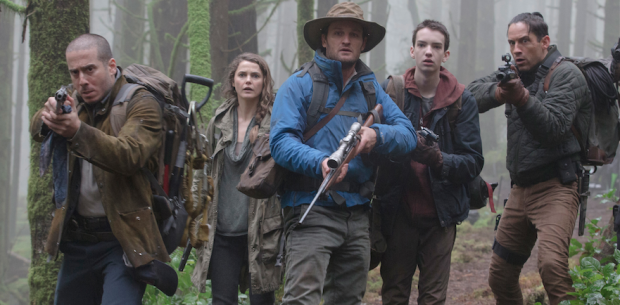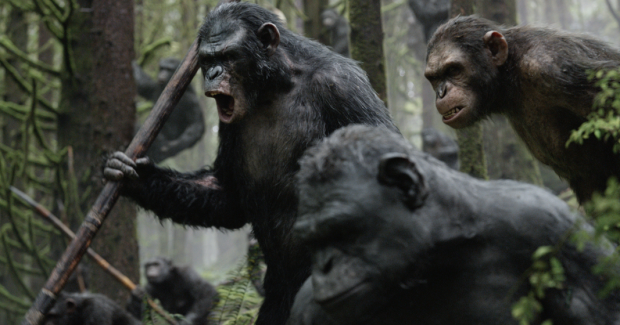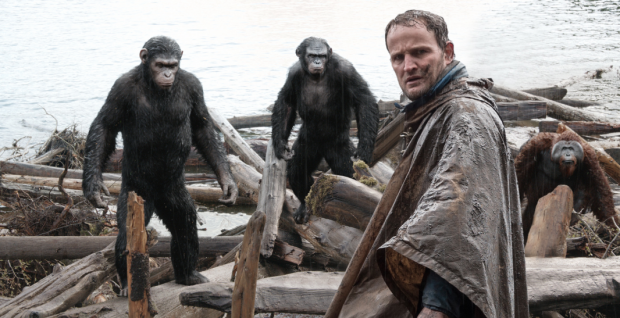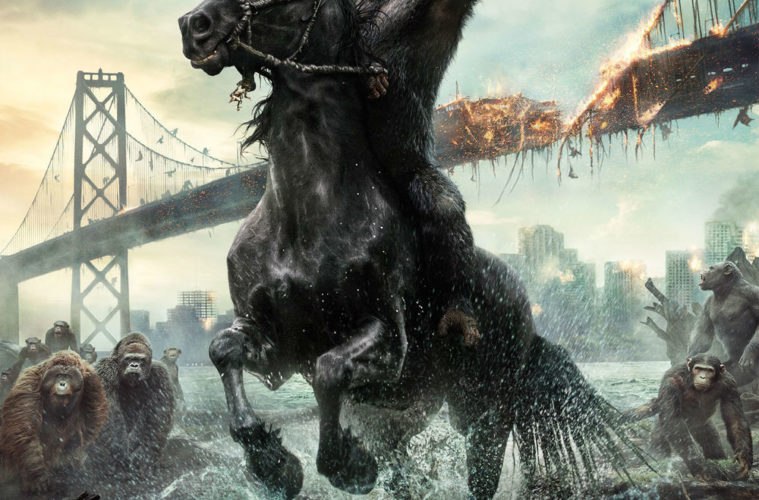Like the 1968 original that started all this cinematic monkey business, Dawn of the Planet of the Apes is a film that surpasses the implications of its title. More smartly nuanced and visually bombastic than any entry in the series, Dawn boasts a surprisingly textured script and great performances from both the men and the apes. Rupert Wyatt’s Rise of the Planet of the Apes was a great little genre movie—reenergizing the concept after Tim Burton’s awkward remake—but the Matt Reeves-helmed follow-up takes the franchise to the next evolutionary level.
Although enhanced chimpanzee Caesar and his simian clan took to the redwood forests of San Francisco at the end of Rise, the humans didn’t fare nearly as well in the long run. The retrovirus that gave the apes their exceptional intelligence proved fatal to humanity and the end credits featured a devastating epidemic whose effects echo throughout Dawn. Instead of opening with a focus on the ravaged human populace, though, the film picks back up with Caesar and the community that he’s strived to forge and maintain. It’s an intriguing and bold choice and changes the tone and approach of the saga. For the apes, humans have been ten years forgotten, and in the moment, we forget about them too.

If Caesar emerged from Rise as the most compelling and endearing creature onscreen, he arrives on the scene in Dawn as the magnetic and emotionally turbulent centerpiece of this inevitably tragic tale. Caesar, triumphantly captured by Andy Serkis and a brilliant effects team, has grown into his role as de facto leader of the apes, with a family of his own that has replaced the surrogate human one he had with Franco’s Will Rodman. With wife Cornelia (Judy Greer), teenage son Blue Eyes (Nick Thurston), and a brand new infant, Caesar has managed to create a microcosm of peace and social cooperation amongst the varied simian species, made possible by the fact that the humans who once stood in their way seem to be extinct.
That peaceful existence isn’t intended to last, as those pesky men aren’t as dead as hoped, and still can’t keep their damned dirty hands off the ape civilization. The immune remnants of San Francisco’s homo sapien population have been struggling themselves to establish stability amidst chaos, and when Jason Clarke’s Malcolm approaches Caesar about restarting a hydroelectric dam in the apes territory, a potential interspecies partnership is struck. While Malcolm and Caesar bond as providers—both for their individual families and the displaced members of their respective enclaves—there are desperate and volatile factions within both camps that will provoke war between the two.

On the human side, there’s Gary Oldman’s compellingly practical Dreyfus, who is narrow-mindedly committed but not evil, and with the apes there’s Toby Kebell’s bitter Koba, whose outrage with the humans comes from a real and understandable place. Eventually the powder keg is lit, and a great battle is sparked, envisioned with such visual panache that it registers as both exhilarating action and heartbreakingly painful to watch. This, in fact, is the unqualified triumph of Dawn of the Planet of the Apes; it’s a blockbuster special effects picture whose primary virtue is thought-provoking empathy. That empathy isn’t just on the surface, but runs deep through the writing and performances, and is generously nourished by Reeves accomplished direction.
On the visual level, Dawn absolutely astounds with its grounded, organic environments—the ape’s founded sanctuary is one of the most thoroughly designed fantasy settings I’ve ever seen—and the monkeys and apes are beautifully diverse, not just as separate species but unique, soulful individuals. My favorite, aside from Caesar, continues to be the quizzical Maurice, the orangutan, who’s best moment in the new film involves discovering the joys of graphic novels with Kodi Smit-McPhee’s Alexander. Serkis deserves all the accolades he’s destined to receive for his work as Caesar; as good as his cross-species outsiders like Kong and Gollum were, the work here takes all of that and expounds upon it. Caesar isn’t just an outcast soul, he’s one who’s forged and remade his world so he has a place within it. The humans are great across the board—Clarke offers real sensitivity and bravado as Malcolm.

Reeves announced himself as a capable director with Cloverfield, even if the film itself was wrong-headed and uneven, and then showcased a distinct maturity with Let Me In, the American adaptation of Let the Right One in. With Apes he proves that he’s come into his own as an action director while stunning with his observations of character relationships. Even when the movie transitions past its more intriguing ideas to the heat of battle, it does not lose its introspective soul. In his staging of each sequence, Reeves honors the exquisite work of the FX artists in ways that most similar pictures don’t. In that way, he emerges as a potential successor to the Spielberg throne, heaping detail and context on the spectacular visuals until they achieve the illusion of plausible reality.
I never expected to see another Planet of the Apes film that surprised me the way the Heston film did upon first viewing, but Dawn hits all the same notes of mystery, wonder, and a thoughtful sense of allegory. We’ve had more than a few worthy sci-fi popcorn pictures this season—including Godzilla, Edge of Tomorrow, and to a greater extent, Snowpiercer. Now Dawn is here, and it’s the best of the bunch.
Dawn of the Planet of the Apes releases on Friday, July 11th.

